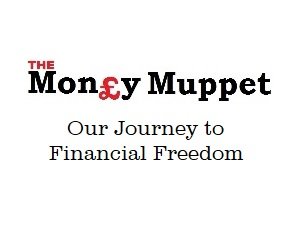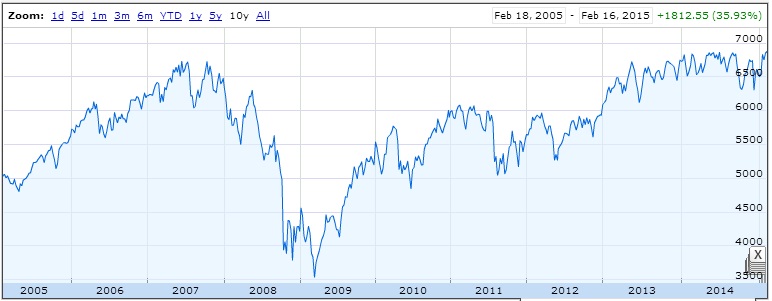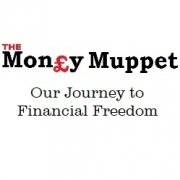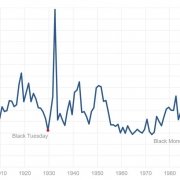Scary Stock Market Investing Simplified
 This blog post about the scary stock market simplified was originally written in November 2014 for our sister website – The Money Muppet. We set that site up in January 2014 as we embarked on our journey to financial freedom. The Money Muppet site no loner exists, so we’ve incorporated our financial journey into our travel blog.
This blog post about the scary stock market simplified was originally written in November 2014 for our sister website – The Money Muppet. We set that site up in January 2014 as we embarked on our journey to financial freedom. The Money Muppet site no loner exists, so we’ve incorporated our financial journey into our travel blog.
Disclaimer: once again, I don’t call this blog the Money Muppet for nothing. I am a novice investor, that’s all! Please don’t act on any of the information below without doing your own research and engaging whatever professional advice you see fit. If on the other hand you spot any glaring errors of judgement on my part, please feel free to help me out and tell me!
There’s a line in the film Titanic where the kindly twinkly-eyed old lady reminisces about the disrespectful toff who’d she’d opted to leg it from when she made it off the boat in one piece. She says something along the lines of ‘yes, he lost a million dollars in the stock market crash of 1948 and topped himself that year’ or some such. This, it transpires, is kinda bull.
Whenever I used to think about the stock market, this is what I mentally saw:
In other words, I’d see huge crashes every few years, at which point anyone stupid enough to be actually investing money in this thing would lose their shirts. Only after actually getting out some books and reading some blogs, it turns out that’s not really how it works, for these reasons:
- You only gain or lose money when you sell your shares, so nothing is lost when the market crashes, unless you panic and sell, or have to sell because you need the money or you have invested in a single company that goes under. That’s why there’s always a disclaimer saying you need to hold shares for at least 5 years to try and avoid buying high and selling low.
- This particular graph is the FTSE 100 index, but any graph like this, of an individual share or index, is only giving you half the story. Companies generally punt out a percentage of their profits as dividends. You get this income as long as you own the shares, you don’t have to sell ’em to get it.
As I tried to work out how we could invest some of our hard-earned in the stock market, these realisations were comforting. Our aim is to keep our investments for maybe 20 years, so the fluctuations in the capital value **should** even out and over the long term **should** increase at over 4% plus inflation (this is the safe withdrawal rate). We’re after passive income, which will come through dividends and **should** steadily flow in, albeit probably at only around 3%.
I also realised that I’m not particularly interested in the stock market and don’t want to be eyeballing various expense rations and Financial Times columns on a daily basis. This, coupled with the fact I don’t want to be shelling £6 to £12 a trade, means I’m ill-suited to trying to manage my own portfolio of shares; I’d be better off choosing a fund of some sort. I then came across the concept of active and passive funds.
The difference is pretty simple: in an active fund, a manager tries to buy and sell shares in order to somehow outperform the overall market. He and his team use whatever info they have to hand to work out which companies will do well, and buy into them, dumping any they think will do poorly. Sounds good, until a bit more digging keeps coming across the same message: they’re not good at it. It’s actually impossible to time the market, working out when best to sell or buy a particular share, the whole thing’s massively erratic and irrational, it can’t be done. It seems roughly 2/3 of the time fund managers fail to beat the market – monkeys should literally do better based purely on chance. Oh, and they charge you a decent wedge of money to do the ‘managing’ for you – the numbers look small like 1.5%, but over time this translates into a big pile of wonga stuffed in their pockets rather than passively earning more readies for you.
So, what about passive funds? These are almost like funds on auto-pilot. They just try to hold a representative stash of shares to match a particular index like the FTSE100. So they don’t do much trading, which saves money as trades cost, and don’t spend money on expensive teams of fund managers. They don’t try to outperform the market, just to match what it is doing: when the market goes up, the fund goes up, when it crashes, the fund crashes. Simple.
Passive funds fit our goals. They’re relatively inexpensive, costing about 0.1 to 0.3% per year. They don’t require me to do a great deal of thinking once they’re bought, they just sit there paying out dividends and, with any luck, tracking the market’s long term gradual climb upwards so when we sell them in the future we earn a capital gain too.
This eventually led me to Exchange Traded Funds (ETFs) from a company called Vanguard. These are passive funds, which invest in real assets (some invest in weird financial bits of wizardry I don’t get and are called synthetic funds – I avoid these) and can be bought as though they were individual shares. Black Rock does a similar line in ETFs. In an effort to learn without huge risk I bought a relatively small amount in four ETFs: VUKE (tracks the FTSE 100), VUSE (Standard & Poor 500), VHYL (supposedly a high dividend yield mix of companies) and VWRL (supposedly an ‘all world; mix of companies). These pay dividends minus costs and tax on a quarterly basis and so far so good, they’re proving steady earners – we’ve only had them for 6 months but they’re looking to generate between 1.64 and 4.45% a year dividend yield after costs.
So that’s where we’re at. We’ll continue to push future earnings into ETFs, and probably in just VUKE and VUSA. We’ll keep an eye on how they’re performing, but it’ll be only once a month or some such. We don’t plan to be eyeballing the FTSE100 every 5 minutes!
Cheers, Jason
Previous: Laid Off and Laid Back
Next: Are we Mad?!






Leave a Reply
Want to join the discussion?Feel free to contribute!